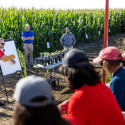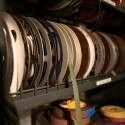UW to fund science journalism fellowship for graduate student
For 44 years, the American Association for the Advancement of Science has taken early-career scientists from the lab bench and parachuted them into newsrooms around the country, giving them experience in reporting and writing the day’s scientific news.
The AAAS Mass Media Science and Engineering Fellows program has trained hundreds of scientists in the craft of clear science communication, and alumni have gone on to become leading researchers, science journalists and policymakers.
For the program’s 45th year in the summer of 2019, the University of Wisconsin–Madison will support a graduate student from the university who is accepted to the program. The funding supports a living stipend for the 10-week fellowship as well as travel to the headquarters of AAAS in Washington, D.C., for training at the beginning and end of the summer.
Support comes from University Communications, the Graduate School, and the Office of the Vice Chancellor for Research and Graduate Education.
“Communicating complex topics in clear and engaging ways is an important part of the research enterprise at UW–Madison and we are excited to support this AAAS program,” says Norman Drinkwater, UW–Madison interim vice chancellor for research and graduate education. “Effective communication helps us improve understanding by the public, media, patients and others about the life changing research we do and outreach is a central component of the university’s mission.”
Participating news organizations range from radio outlets like National Public Radio, to magazines such as National Geographic and Wired, to national and regional newspapers like the Washington Post and the Milwaukee Journal Sentinel. Fellows spend 10 weeks as full members of the newsroom, learning from the country’s top science journalists and reporting dozens of original stories.
“The program has supported a good number of Wisconsin students throughout the years and that is a point of pride,” says Terry Devitt, the director of research communications for UW–Madison. “Having hired several former fellows, I can readily attest to the quality of the program and how well it prepares people to take their places in the science writing world. For our university, this is an investment that makes sense on so many levels.”
UW–Madison joins the University of California, Davis, and Duke University in signing on as sponsors of accepted university members. University sponsorship does not alter eligibility requirements, and competitive applicants will have a demonstrated interest in science communication and strong writing samples.
“The ability to communicate the significance and impact of research findings is an essential skill that all graduate students must develop,” says Graduate School Dean William Karpus. “Participation in this fellowship program will prepare graduate students to communicate research results to a broad audience that includes both individuals with disciplinary knowledge and those outside the discipline that have an interest in how the findings affect policy development and everyday life. Science communication by UW–Madison graduate students is an essential component of the Wisconsin Idea.”
The fellowship is open to undergraduate and graduate students or postdoctoral researchers in all science fields including engineering, mathematics and the social sciences. Students enrolled in journalism or science journalism are not eligible. UW–Madison support will go to an accepted applicant who is a graduate student at the university and who remains in student status during the fellowship. Additional funding from AAAS, other scientific societies, and foundations is available for other eligible applicants from the university.
Applications are open now through Jan. 15. For more information, visit the fellowship’s website or contact Eric Hamilton in University Communications.




